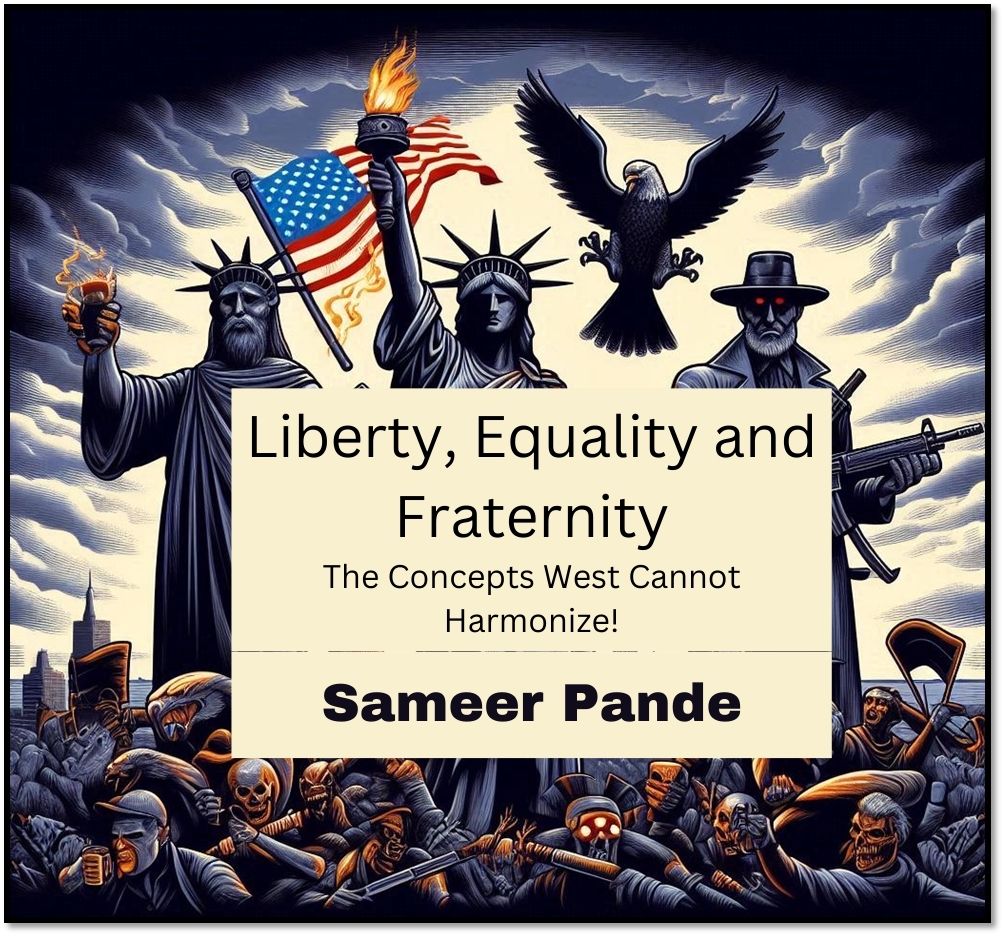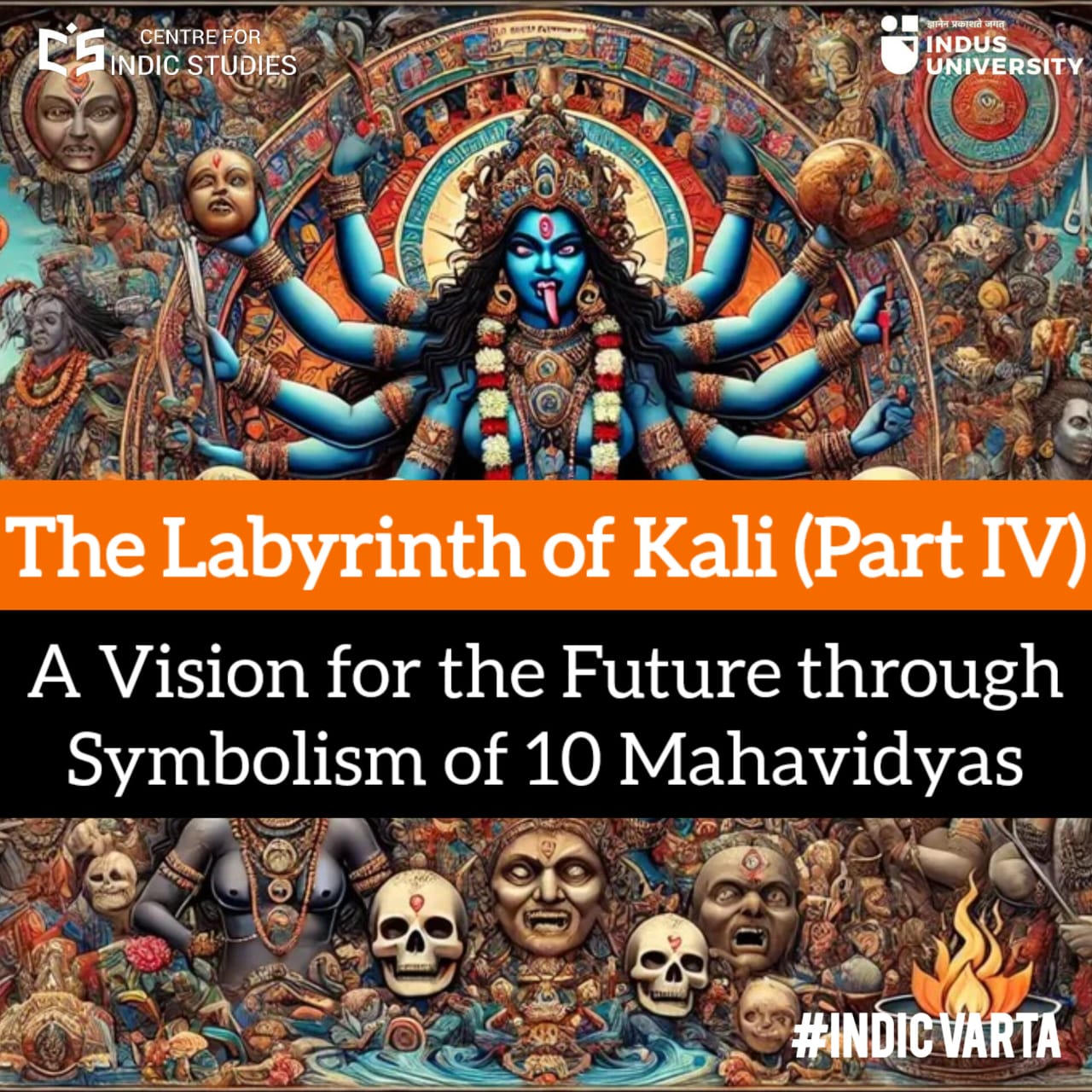- Visitor:152
- Published on: 2024-08-27 05:56 pm
Liberty, Equality and Fraternity – The Concepts West Cannot Harmonize!

The guillotine,
hailed as the symbol of ultimate equality in death, was to Burke a monstrous
contraption that consumed lives with a voracious appetite. He mourned to the
loss of chivalry and tradition, swept away by the relentless tide of radical
change. “The age of chivalry is gone,” he declared, “that of
sophisters, economists, and calculators has succeeded.” The Reign of
Terror, in Burke’s eyes, was the inevitable outcome of the revolution’s
unchecked fervour. And why won’t he criticize the French Revolution? He saw it
as a grim testament to the dangers of absolute power, even when wielded by
those who once cried out against it. “In their fanaticism for liberty,”
he warned, “they have lost their humanity.” Thus, through Burke’s
critique, the French Revolution transforms from a beacon of enlightenment into
a cautionary tale of unchecked idealism and the loss of societal balance. It
serves as a stark reminder that the road to hell is often paved with good
intentions.
But, the obsession
of the
west, being proud of the concepts as they think gave to the world, ‘Liberty,
Equality and Fraternity’ still continues. Today, the same France faces and suffers
to the unhinged atrocities of ‘too-much’ liberty that it was proud about. With
such analysis of historical evolution of thoughts and ideas, and believing like
the west in the
French Revolution of 1789 as a watershed moment in its history, and giving rise
to the slogan "Liberté, égalité, fraternité" needs a revisiting.
This visitation
re-evaluation is necessary because the revolutionary mantra encapsulates the
aspirations of a society seeking to overthrow entrenched hierarchies and
establish a more just and equitable social order being true, still hides the
extremism through which it opens the pandora box of modern sophisticated
issues. It is also necessary to re-evaluate because as western ideas are
grappling and engrossing ideas and thoughts on non-western world, this will
boomerang to the new world.
This essay
explores the historical roots of liberty, equality, and fraternity, examines
the tensions and challenges associated with harmonizing these principles, and
reflects on the ongoing struggles to integrate them within contemporary Western
societies. Furthermore, in part two of this essay, it is also discussed how
from Indic perspective, this harmonization is possible.
Understanding the triads:
The consequential events
and rise of the ‘what ifs’ of the triads. What if – this liberty starts
questioning the liberty itself? The freed starts to bound the freedom? What if
– the equality blurs the line between right and wrong and becomes the beacon of
equality even among the unequal? What if, correct and incorrect and appropriate
and inappropriate become twisted, falling into cognitive trenches of fallacies,
to be proven the same under the flagship of ‘political correctness’? What if –
fraternity finds herd-ism, mob-ism and group-ism against the opposition of
universalism and all-accepting ideas? And many ‘what ifs’ of this pandora box.
The triad of ‘Liberty,
Equality, and Fraternity’ represents foundational principles to the west which have
profoundly influenced their political thoughts and practices in their world and
the world they ruled. The practicality and natural understanding of these
ideals fails to conceive as guiding pillars for a social order. Therefore, the profound
impact on shaping modern democracies, the Western world has still grappled with
the question of reconciling these concepts.
Liberty, the
believed epitome of individual's right to freedom and autonomy, encompasses
civil liberties such as freedom of speech, religion, and the press, as well as
the freedom from oppressive governmental control. The idea, despite liberating
and fascinating and deeply influenced by Enlightenment thinkers like John Locke
and Jean-Jacques Rousseau, championed in the notion that individuals possess
inherent rights that should be protected by law for his/her and even Ze/they/it
(if you believe this!) rights and the law should not become a tool of anyone to
limit those rights. But, the extremities of this is in the failure of west to
make people understand the basis on which those rights are demanded.
Equality, another
pole of the triad, is an action-based principle, proposes for equal status and
opportunities of all individuals. This challenges societal hierarchies and aims
to dismantle the privileges enjoyed by the few at the expense of the many. This
is actually a call for equal treatment under the law, equal access to
opportunities, and the eradication of social and economic inequalities. But
with the extremities of equality, the line blurs to balance out between
equality and equity and balance out between merit and reservation and treating
equally equal and unequally unequal.
Fraternity, a
sense of solidarity and mutual support among individuals, emphasizes the
importance of community and collective well-being, advocating for social bonds
that transcends individualistic pursuits and foster a sense of shared
responsibility while understanding the core beliefs of any religious groups. The
concept despite revolutionary and aspirational, the question of inclusivity and
exclusivism has proven its implementation more complex and contentious. The
western world based upon the strict adherence to religion calling for
‘exclusivism’ through conversion, disables them within core to accept ‘others’.
The Tensions between the
triads:
One of the primary
challenges before west is in reconciling these principles. The west with the
burst of liberty and values attached to it, often emphasizes on individual
freedom and the right to pursue personal goals. The race has no breaks which
causes individualism overshadowing the social needs. Therefore, the western
concept of liberty often conflicts with the aim of achieving equality. West
cannot stand on two opposing positions. For instance, the protection of
individual property and rights attached to it, a key component of liberty, leads
to disparities in wealth and economic inequality and only performs well when
state involves in this complexity. Without state or forced religion as
Christianity and Islam, individual from west have no incentive to provide or give
back to the society or harmony even in limited to the specific religion. Even
modern taxes have been exposed as chains increasing individual exclusion from
society is criticised by libertarians.
Conversely,
efforts to promote equality, such as progressive taxation or social welfare
programs, is perceived as encroachments on individual liberty. Critics argue
that redistributive policies restrict personal freedom by limiting individuals'
ability to freely use their resources. Again, the west fails to make their
public understand wealth as a social outcome rather than individual pursuit.
In a capitalist
system, where individual success and wealth accumulation are encouraged, the
resulting economic disparities undermine the pursuit of equality. Those with
greater resources have more opportunities to influence political and economic
systems, leading to a concentration of power and wealth that easily perpetuate
inequality. Calling this action as natural also seems ‘right’ from one
perspective. It is also been affirmed when examples are shown of how despite
having equal opportunities, many fails to achieve the better of the situation.
At such crossroads, the society needs the understanding of inclusivity and
all-accepting nature.
Fraternity, or
social solidarity, the word for commune for common goal, introduces another
layer of complexity. While fraternity emphasizes community and mutual support,
it can conflict with the principles of individual liberty and autonomy. The
challenge is to foster a sense of collective responsibility without
compromising personal freedoms as individual needs a space of change in social
commune structure. In contemporary Western societies, the concept of fraternity
is often manifested through social safety nets and community-oriented programs.
However, these measures can sometimes be met with resistance from individuals
who prioritize personal autonomy over collective responsibilities and even on
other hand, many religious institutions have built an over-binding regulation
over individuals giving zero level of space of liberty example being rules laid
on women. Balancing the needs of the community with allowing the rights of
individuals remains a persistent challenge. Because, in the name of fraternity
and social solidarity, the extended version of ‘liberalism’ has crossed the
boundaries of all basic social setups.
Harmonizing challenge:
The difficulty in
harmonizing these principles is evident in various historical and contemporary
contexts. For instance, the American Civil Rights Movement of the 1960s sought
to address issues of racial inequality and discrimination, reflecting the
struggle to achieve equality while respecting individual liberties. The
movement highlighted the need for legal and social reforms to ensure that the
ideals of liberty and equality were more realized. But, even after the
realization of the liberty and equality at institutional level, on ground there
is different picture. On the contrary, the mob has stretched it to the
extremities in the name of ‘woke-ism’ while there is a rise of discrimination
even among the same people who were once discriminated.
In Europe too, the
rise of populist movements has exposed tensions between liberty, equality, and
fraternity. Populist leaders often frame their platforms around protecting
national identity and cultural homogeneity, which clashes with the principles
of equality and fraternity in multicultural societies. And recently, the debate
over immigration and social integration demonstrates the complexities to
reconcile those values in a globalized western world.
The most
antithetical condition is of the west Asian migration into France and other
European countries. The followers of ‘exclusivists-non-liberal’ ideas as immigrants
are demanding from ‘liberal constitution’ for liberal rights to allow them to
follow their ‘unliberal views’ and actions. In first place, they were removed
from the same ‘unliberal comraderies’ they choose to elect and support.
This problem has
risen because of the overall setting of the social structure in the western
world. There is a lack of social setup of the west society which lacks inheritance
of morality. Also, the ills of Abrahamic traits of ‘exclusivism’; the dark
history of crusades and slavery; and the rise of the ‘brotherhood’ being
exclusive and expecting inclusivity from others is another problem that west
face today to harmonize liberty, equality and fraternity.
The way forward:
West has always faced
criticism from various ideological perspectives. From economic side, the Libertarians
argues that too much emphasis on equality has undermined individual freedoms
and economic incentives. Conversely, the socialists criticize liberal
democracies for failing to adequately address systemic inequalities and promote
genuine social solidarity even raising the question of how to accommodate the
‘exclusive’ believing ideologies. Moreover, the concept of fraternity has been
challenged by critics who argue that it can sometimes lead to exclusionary
practices. In attempting to foster solidarity, societies may inadvertently
marginalize those who do not conform to prevailing norms or values.
The challenge of
harmonizing these principles is a persistent and evolving issue because of the
dark history of social tensions and community-based atrocities. Thus, if west
has to solve those problems they have to come out of the complexities of the
triad where the Western political thought and the political thinkers has confined
their thought process. They failed to understand the need for cultural and
spiritual alignment of the society (may learn from Bharat!).
The Western
approach in harmonising liberty, equality, and fraternity is also not possible
unless ‘constitutionalism with secularist State’ do take stringent interference
in the society and not allow religion to interfere in individual’s public
sphere. Or else, west need to inculcate aspirations among the citizens for a
just and equitable society where individuals truly believe in the good of the society
and make that their priorities. The tensions between individual freedoms and
collective responsibilities, as well as the complexities of achieving true
social nature still continues and become a major issue of discussion.
It is necessary to
discuss this as there is already a beginning of the spread of western
ideologies into India. This has already started increasing social tensions
among the people with different social issues. This is because of the western
influence and the narratives making people and society to forget their
cultural-civilizational ethos and its high time to understand the
civilizational ethos of the land which helped to harmonize the triads.
(To be continued...)
- 76 min read
- 10
- 0










